I present you the Strength mechanic. Strength is essentially some kind of resource that does not accumulate over time, but rather that you have at a given moment in your play area and/or your hand. Just like

, really. Cards that involve this mechanic are
wine colored and come with the “Strength” label on the bottom of them. This is how you recognise such cards. If Strength cards are used in a game, I recommend using 2 Kingdoms being Strength typed, just like Donald recommend at least 2 Potion Kingdoms if they are used. However, a lone Strength Kingdom in a game will work just fine. Likewise, more than 2 Strength cards in a game can also work. If you like to get mot chaotic, then get crazy!

Now, how does it work? Strength cards all provide Strength, denoted with this icon:

. Each

given to you appears on the bottom of the Strength cards, under an horizontal line.
How do you utilize these given

? What do they do for you? Well. Each Strength typed card come with a “If most

” clause. If, when you compare your number of

with the number of

each other player has individually, you have the most (and
NOT tied for the most), then you must perform that clause. Otherwise, you do not gain the bonuses granted by that condition. Sometimes, you’ll have an “Otherwise” part afterwards. If you did not have the most

, then you must perform everything stated after that clause. It probably won't be good for you.
So how do you compare your number of

against other players’? First, this comparison happens IMMEDIATELY when you play a Strength card. Do whatever the card says and then, when you reach the “If most

” part, you do the comparison. Each Strength card in play from THE ACTIVE PLAYER have their

added up. This is the ACTIVE PLAYER’S

TOTAL. Then, each OTHER PLAYER, starting from the left of the active player and going clockwise, may or may not reveal Strength cards from their hand. This number is not limited, players may reveal any number of Strength cards from their hand. These other players then add up all of their own revealed

, and this is their own

total.The moment another player beats your

total, the comparison stops and you fail the “If most

” clause of your card. You must perform the “Otherwise” part, if there is any. Your

total must be compared again each time you play a Strength card, even in the same turn.
What I expect out of this mechanic:
- Intense battles for Strength cards. Usually, they are underpriced compared to what they can do if fully powered. You do not want to let your adversaries run wild with these, especially since some of them are also nasty Attacks. This might make you reconsider certain Buys you would have otherwise taken and make mundane Province rush games a little trickier to balance. Winning a split of Strength cards should be at your advantage, since you are expected to have more
 in your deck, allowing you to trigger the most of these cards and circumventing your opponents to use theirs. The good part about it is that it’s not all lost though. There’s still some luck in your draws involved, although getting more Strength cards improve your odds.
in your deck, allowing you to trigger the most of these cards and circumventing your opponents to use theirs. The good part about it is that it’s not all lost though. There’s still some luck in your draws involved, although getting more Strength cards improve your odds. - The idea behind Strength cards was also to up the player *direct* interactions outside of stuff like Attack cards. I got partially inspired by Through the Ages: A New Story of Civilization (which I must’ve played 500 or more games of).
- Another important point to consider here is that the first player advantage part of getting Strength cards first is mitigated. Because your opponent(s) might've drawn their Strength card(s) on their first shuffle, negating your own Strength card.
Here are 12 Kingdom cards utilising this mechanic. I know this is more than what this challenge limited us to, but this was to demonstrate how multiple concepts would intertwine with Strength cards. These are sorted by complexity, with the simpler cards being presented first.
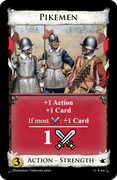
| |  Pikemen Pikemen (Action – Strength) +1 Action +1 Card If most  : +1 Card
1  |
This is the simplest, most straight-forward Strength card out of the set. A  Laboratory, if you have the most
Laboratory, if you have the most  , what’s not to love? Well, your opponent trying to deny you of this a-little-too-easy-path-to-victory-thank-you, for one. Then it’s a useless cantrip. Again, for
, what’s not to love? Well, your opponent trying to deny you of this a-little-too-easy-path-to-victory-thank-you, for one. Then it’s a useless cantrip. Again, for  . Suddenly, it’s not really worth it anymore, isn’t it?
. Suddenly, it’s not really worth it anymore, isn’t it?
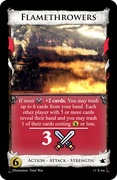
| | 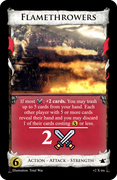
| |  Flamethrowers Flamethrowers (Action – Attack – Strength) If most  : +2 Cards. You may trash up to 5 cards from your hand. Each other player with 5 or more cards reveal their hand and you may discard 1 of their cards costing  or less.
2  |
Flamethrowers was bonkers before! 3  on a single card is just too much. It should never get that overpowered. Especially if you’re the first one to afford one. This is how you nullify your competition, pretty much. So now it is worth 2
on a single card is just too much. It should never get that overpowered. Especially if you’re the first one to afford one. This is how you nullify your competition, pretty much. So now it is worth 2  . Secondly, you can now trash up to 5, not 6. Small change, but eh. Finally, it doesn’t trash a card of your choice from your opponents’ hands costing up to
. Secondly, you can now trash up to 5, not 6. Small change, but eh. Finally, it doesn’t trash a card of your choice from your opponents’ hands costing up to  anymore, it discards it. Still mean, but it’s not a deck killer at least.
anymore, it discards it. Still mean, but it’s not a deck killer at least.
| |  Experimental Magic Experimental Magic (Action – Attack – Strength) You may trash a card from your hand. If most  : Each other player gains a Curse onto their deck. Otherwise: Gain a Curse.
1  |
I wasn’t lying when I said “there’ll be more”, when it comes to Attacks. This one’s a Curser. This was the last card I added to this set, out of curiosity to see how a Strength card would interact with Curses. So here it is. This is our first “Otherwise” card, meaning your plans can fail miserably. Thus, this might be a self-Curser if used incorrectly. But but but, it can trash. So if you failed your little magical experiment, then you’ll always have the possibility of trashing the Curse it induced. It is terminal, has a Sea Hag mechanic and so I priced it at  .
.
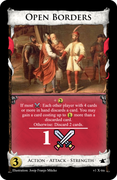
| |  Open Borders Open Borders (Action – Attack – Strength) +  If most  : Each other player with 4 cards or more in hand discards a card. You may gain a card costing up to  more than a discarded card. Otherwise: Discard 2 cards.
1  |
Did I say I got inspired by Through the Ages : A New Story of Civilization? I hope this is proof enough, here. Thematically, we have something funny here. You try to take advantage of an open border agreement with neighboring civilizations, planning a foray into their land, taking what you can. However, this can backfire if they planned to make the most of that agreement themselves beforehand. So, either you Militia yourself, or you make them discard to potentially gain something. End games are going to be funny with this one. A careless Attacked player might think they’re smart by discarding a Province to Open Borders. “It was useless in my hand anyway”, they might say. Until they realize that they just allowed you to gain a Province yourself. Oops.
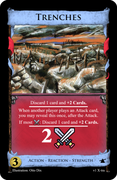
| | 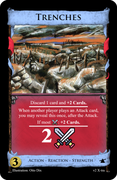
| |  Trenches Trenches (Action – Reaction – Strength) Discard 1 card and +2 Cards.
When another player plays an Attack card, you may reveal this once, after the Attack. If most  : +2 Cards.
2  |
Trenches simply doesn’t make you discard anymore when you use it as a Reaction. Why would you want to actively hurt yourself when Reacting is supposed to help you? Isn’t the Attack you’re Reacting to enough?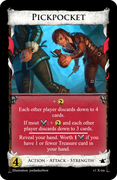
| |  Pickpocket Pickpocket (Action – Attack – Strength) +  Each other player discards down to 4 cards. If most  : +  and each other player discards down to 3 cards.
Reveal your hand. Worth 1  if you have 1 or fewer Treasure card in your hand. |
I said there was more upcoming Attack cards, but it won’t be all that, I swear! Anyway, we are now entering “varying amount of  ” territory. Pickpocket works well in a deck with barely any Treasures. In contrast, it bodes well against Big Money goers. Big Money guys probably won’t be able to get their
” territory. Pickpocket works well in a deck with barely any Treasures. In contrast, it bodes well against Big Money goers. Big Money guys probably won’t be able to get their  going from Pickpocket, but a thinned Engine deck will. So you’re probably going to come out on top when comparing
going from Pickpocket, but a thinned Engine deck will. So you’re probably going to come out on top when comparing  if that’s what you’re going for. Now, as it is, this card is a weaker Militia for its price. Unless you trigger Pickpocket’s full effects. Then it’s a super Militia ! Worth mentioning that the “reveal your hand” part is unconditional. You must do it when you play the Pickpocket.
if that’s what you’re going for. Now, as it is, this card is a weaker Militia for its price. Unless you trigger Pickpocket’s full effects. Then it’s a super Militia ! Worth mentioning that the “reveal your hand” part is unconditional. You must do it when you play the Pickpocket.
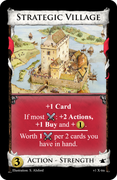
| | 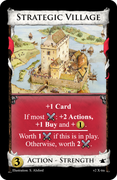
| |  Strategic Village Strategic Village (Action – Strength) +1 Card If most  : +2 Actions, +1 Buy and + 
Worth 1  if this is in play. Otherwise, worth 2  |
It is now a riskier Village. I changed this because chaining these was too easy. Besides, it’s more thematically coherent now. This village represents a bastion of safety. Thus, using it as a sort of “defense” against someone who’s doing a display of strength should be what Strategic Village tries to accomplish. And now it does. It is weaker in play than it is in hand. Other players can block your little engine with less trouble with this new version.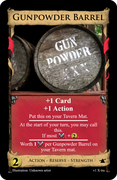
| | 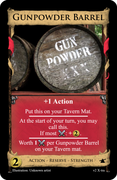
| |  Gunpowder Barrel Gunpowder Barrel (Action – Reserve – Strength) +1 Action Put this on your Tavern mat.
At the start of your turn, you may call this. If most  : + 
Worth 1  per Gunpowder Barrel on your Tavern mat. |
This, a cantrip? No. Suffered the “it was too easy to get there” syndrome, again. So now it just does “+1 Action” before being put on your Tavern Mat.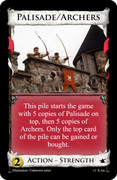
| |  Palisade/Archers Palisade/Archers (Action – Strength) This pile starts the game with 5 copies of Palisade on top, then 5 copies of Archers. Only the top card of the pile can be gained or bought. |
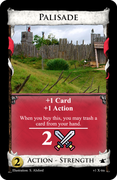
| | 
| |  Palisade Palisade (Action – Strength) +1 Card +1 Action When you buy this, you may trash a card from your hand.
Worth 1  if you have another Palisade in play. Otherwise, worth 2  . |
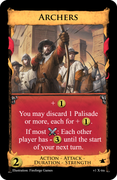
| | 
| |  Archers Archers (Action – Attack – Duration – Strength) Choose: +1 Card; or +  You may discard any number of Palisades, each for +  . If most  : Each other player has –  until the start of your next turn. |
And then, we have Archers, again. I mentioned in my original post that I was the most unsure about this card. I still am. But this looks... better, now? Discarding Palisades will give you your money, but will drive you further away from the Attack part. And you have the choice of +1 Card or +  . Choices, man. Hey, speaking of Palisades. Now, it goes like this: You play a Palisade. Congrats, you have 2
. Choices, man. Hey, speaking of Palisades. Now, it goes like this: You play a Palisade. Congrats, you have 2  . Now you play another one. Your
. Now you play another one. Your  total is still 2. Because they are now worth 1
total is still 2. Because they are now worth 1  each. Other people’s Palisades are still packing their full 2
each. Other people’s Palisades are still packing their full 2  punch. And this is what Palisades should do: Be used more as a defense than as an attack. This new scaling is pretty neat, I think.
punch. And this is what Palisades should do: Be used more as a defense than as an attack. This new scaling is pretty neat, I think.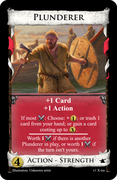
| | 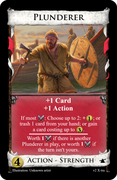
| |  Plunderer Plunderer (Action – Strength) +1 Card +1 Action If most  : Choose up to 2: +  ; or trash 1 card from your hand; or gain a card costing up to  .
Worth 1  if there is another Plunderer in play, or worth 1  if the turn isn’t yours. |
He had a hard time, so now, if this is catharsis enough, he can pick up to 2 things in the list of things he can do. Trivially superior to what it was before, in my opinion.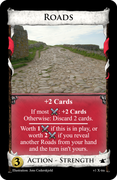
| |  Roads Roads (Action – Strength) +2 Cards If most  : +2 Cards Otherwise: Discard 2 cards.
Worth 1  if this is in play, or worth 2  if you reveal another Roads from your hand and the turn isn't yours. |
This one’s so niche. A cheaper Smithy that can be weaker or better. When I mean weaker, I mean way weaker! Not even worth  kinda weak. And when I mean better, I mean way better! +4 cards at
kinda weak. And when I mean better, I mean way better! +4 cards at  is the deal of the century. This is the only card where, in a vacuum, you’ll have an easier time getting the most
is the deal of the century. This is the only card where, in a vacuum, you’ll have an easier time getting the most  playing it rather than revealing it. It should be the opposite in retrospective. I dunno. Help me.
playing it rather than revealing it. It should be the opposite in retrospective. I dunno. Help me. 
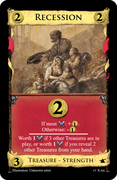
| |  Recession Recession (Treasure – Strength)  If most  : +  Otherwise: – 
Worth 1  if 3 other Treasures are in play, or worth 1  if you reveal 2 other Treasures from your hand. |
Last but not the least! A Strength/Treasure hybrid! This card simulates a situation where your civilization’s strength and might can make you easily overcome a period of economic toughness, or where your civilization didn’t get strong enough to prepare for the harsh Recession at hand. So this is either a Copper or a Gold, depending of your Strength. You have 2 ways to go about this one and this can create quite the dilemma. Big Money enabler here, in my opinion.
EDIT: Edited this post. Removed a lot of useless paragraphs of text. Added a rule change as to how your Strength is compared to other players’ Strength. Added the modification to certain cards.
 Author
Topic: Weekly Design Contests #1 - #100 (Read 1679279 times)
Author
Topic: Weekly Design Contests #1 - #100 (Read 1679279 times)
